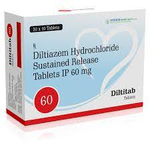dicard
Introduction to Dicard
Dicard is a medication primarily used to manage certain cardiovascular conditions. It is known for its effectiveness in treating hypertension, angina, and certain types of arrhythmias. By helping to relax and widen blood vessels, Dicard ensures better blood flow and reduces the heart's workload. This medication is often prescribed by healthcare professionals to help patients maintain a healthier heart and circulatory system. Dicard is available in various forms, including tablets, capsules, and injections, making it versatile for different patient needs and preferences.
Composition of Dicard
The active ingredient in Dicard is Diltiazem, present in a dosage of 30mg. Diltiazem is a calcium channel blocker that works by inhibiting the influx of calcium ions into cardiac and smooth muscle cells. This action helps in dilating the blood vessels, reducing the heart rate, and lowering blood pressure. By doing so, Diltiazem effectively alleviates the symptoms associated with high blood pressure and angina, providing relief and improving the quality of life for patients.
Uses for Dicard
- Management of hypertension (high blood pressure)
- Treatment of chronic stable angina (chest pain)
- Control of certain types of arrhythmias (irregular heartbeats)
- Prevention of heart attacks in patients with coronary artery disease
Side Effects of Dicard
- Dizziness or lightheadedness
- Flushing or warmth in the face
- Weakness or fatigue
- Swelling in the ankles or feet
- Headache
- Nausea
- Bradycardia (slow heart rate)
Precautions of Dicard
Before taking Dicard, it is important to inform your healthcare provider about any existing medical conditions, especially liver or kidney disease, heart conditions, or if you are pregnant or breastfeeding. Avoid consuming grapefruit or grapefruit juice while on this medication, as it can interfere with the effectiveness of Diltiazem. Patients should also avoid driving or operating heavy machinery until they know how Dicard affects them, as it can cause dizziness. Regular monitoring of blood pressure and heart rate is recommended to ensure the medication is working effectively.
Conclusion
Dicard, with its active ingredient Diltiazem, is a trusted medication for managing cardiovascular conditions such as hypertension and angina. Available in tablets, capsules, and injections, it offers flexibility in administration to suit patient needs. While effective, it is important to use Dicard under medical supervision and adhere to prescribed dosages to minimize potential side effects and achieve optimal results. Always consult with a healthcare professional for personalized advice and guidance when using Dicard.
Similar Medicines
Related Faqs

Does Ionozem CD cause weight gain?
While Ionozem CD can potentially result in weight gain it does not affect everyone in the same manner If you do find yourself experiencing weight gain while on Ionozem CD it is advisable to seek guidance from either your doctor or a nutritionist By consulting with a medical professional or an expert in nutrition you can better understand the specific factors contributing to your weight gain and explore potential strategies to manage it effectively It is important to recognize that weight gain is not a guaranteed side effect of Ionozem CD and may vary from person to person Therefore seeking professional advice can help you make informed decisions and develop a personalized approach to address any concerns related to weight gain while taking this medication

What are the serious side effects of Psydil?
Psydil can lead to some severe adverse effects that should not be ignored These include the emergence of a severe allergic reaction evident by symptoms such as skin rash itching swelling severe dizziness and trouble breathing Moreover it may cause jaundice characterized by yellowing of the skin or eyes indicating potential liver damage Nausea and extreme fatigue are other concerning side effects that demand attention Additionally Psydil is known to disrupt normal blood clotting resulting in unusual bleeding or bruising One may also experience a lack of energy loss of appetite and abdominal pain as a consequence of using this medication In certain instances patients may encounter flulike symptoms and an exacerbation of chest pain particularly in cases of angina These symptoms should not be dismissed as they may indicate serious complications If you experience any of these adverse effects it is crucial to promptly seek medical assistance and inform your healthcare provider about your condition They will be able to assess your situation and provide appropriate guidance or adjustments to your treatment plan to mitigate the potential risks associated with Psydil Remember a timely response can often make a significant difference in managing and minimizing the impact of these side effects
Related Posts

1:15
Vaginal Fart: Symptoms, Causes, Prevention and More!

1:15
Home Remedies for Dry Cough | Best Foods & Tips for Fast Relief!

1:15
Men’s Health Essentials: 3 Powerful Vitamins & Minerals!

1:15
10 Health Benefits of Hard-Boiled Eggs: Nutrition!

1:15
Which 3 Vitamins Do Seniors Need Most for Healthier Aging?


















.svg)
